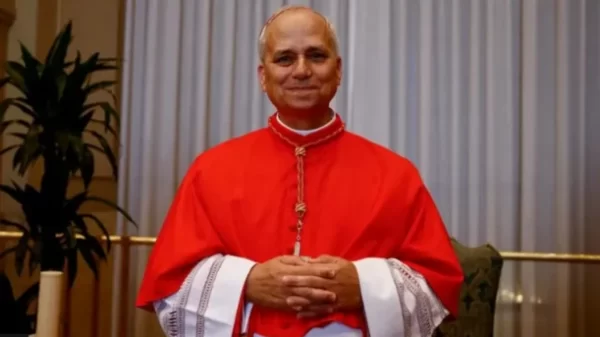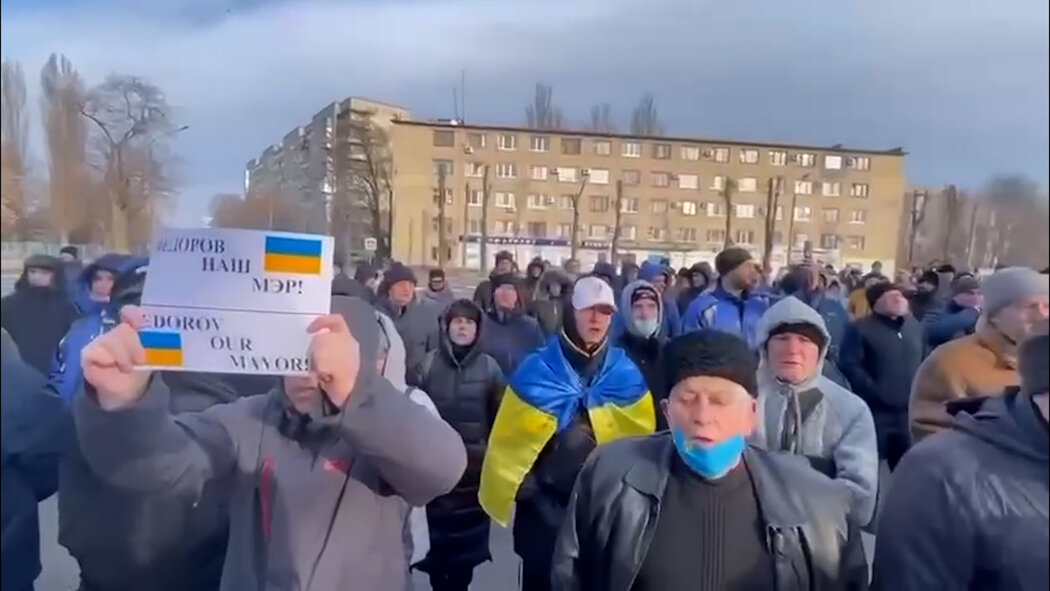The 33-year-old mayor of Melitopol, Ivan Fyodorov, encouraged defiance. Then he was arrested, and hasn’t been heard from since.
LVIV, Ukraine — Ivan Fyodorov, as his name suggests, is an ethnic Russian in a southern Ukrainian city where Russian is commonly spoken and where cultural and familial ties to the motherland run deep.
That would seem to make Mr. Fyodorov, the mayor of Melitopol, just the kind of person to welcome conquering Russian soldiers with open arms and flowers.
Instead, he labeled them “occupiers.”
On Friday evening, those Russian soldiers threw a bag over Mr. Fyodorov’s head and dragged him from his government office, Ukrainian officials said. Security camera footage from Melitopol’s Victory Square appears to show someone being escorted out of a government building by soldiers, but The Times could not verify the identity of the people in the video.
The Russian news agency Tass reported on Saturday that the prosecutors office in Luhansk, one of the breakaway areas recognized by Moscow, was preparing terrorism charges against Mr. Fyodorov, accusing him of raising money of the far right group Right Sector.
On Saturday, hundreds of his townspeople poured out into the streets in an expression of outrage and defiance, despite the presence of Russian troops.
“Return the mayor!” they shouted, witnesses said and videos showed. “Free the mayor!”
Nearly as soon as people gathered, the Russians moved to shut them down, briefly detaining one woman who they said had organized the demonstration, according to two witnesses and the woman’s Facebook account.
Ukraine’s president, Volodymyr Zelensky, who has similarly greeted the Russian offensive with defiance and bravado, said the kidnapping of the mayor demonstrated the falsehood propagated by the Kremlin of a Russian incursion to save the country from a cabal of neo-Nazis in the capital, Kyiv.
“For years they have been lying to themselves that people in Ukraine were supposedly waiting for Russia to come,” he said. “They did not find collaborators who would hand over the city and the power to the invaders.”
Melitopol came under fierce assault on the first day of the war, Feb. 24, and Russian soldiers entered only days later. Since then, Mr. Fyodorov had openly encouraged resistance, earning him the support of the public and the ire of the occupying army.
The mayor, 33, lanky, fit and photogenic, posted brief live broadcasts almost daily on social media to update Melitopol residents on the situation in the city — which lies just north of Crimea, the peninsula that Russia annexed in 2014. On at least one of the posts, explosions could be heard in the night behind him as he tried to reassure residents that the city was functioning as normally as possible.
On March 2, for example, noting that armed men had opened fire in the direction of some demonstrators, he warned residents away from confrontations with the Russian soldiers during protests and asked them to respect a 6 p.m. curfew. “I consider it unacceptable when civilians are shot at!” he wrote. “Melitopol residents, in turn, are asked not to provoke and to behave peacefully on the streets. Our task is to save your life and safety.”
On March 5, he announced that the city was working to restore 31 private houses destroyed by the Russian forces, and he repeatedly thanked local firms for contributing goods and services to help hundreds of displaced families.
All along the mayor made it abundantly clear that his administration would not cooperate with the Russians, and he kept the Ukrainian flag flying high over the city’s central square.
“We are not cooperating with the Russians in any way,” Mr. Fyodorov said in an interview with the BBC two days before he was taken by the Russian soldiers. “They have not tried to help us, they cannot help us and we do not want their help.”
He told residents where to buy milk and medicine, published updated lists of what pharmacies or A.T.M.s were operating and warned repeatedly that looters would be identified and punished. He urged them to keep paying their electricity bills, since the money went toward salaries, and as public transportation ceased operating asked residents to give free rides to medical workers.
Residents responded with an outpouring of gratitude, thanking him profusely for staying at his post even after the Russian troops controlled the city. “You are the best mayor!” read one enthusiastic response to his social media messages, while another wrote “You are our hope!!”
Others worried about his health, given that Mr. Fyodorov appeared oblivious to the cold, standing outdoors in just a light sweater and a down vest as the winter wind howled around him.
“Ivan Sergeyevich, why don’t you take care of yourself?” wrote one woman, using his first name and his patronymic, a polite form of address in the Russian-speaking world. “Are you standing without a jacket in such cold weather? Please dress warmer!”
Born in Melitopol, a city of just over 150,000 people, Mr. Fyodorov holds degrees in economics and management, and worked briefly for a company doing medical imaging before entering politics. He served on the city council for five years, from 2010 to 2015, and held various posts including deputy mayor, before being elected mayor in December 2020.
To that point, while he may have harbored exceptional talents, in the eyes of the world he was just another anonymous local official.
Then came Feb. 24, and his courageous stand against the Russian occupiers. But then he was led away in the hood, and has not been seen or heard from since.
Russia-Ukraine War: Key Things to Know
On the ground. Russian forces, battered by the local resistance, have stepped up their bombardment across Ukraine. In Kyiv, artillery battles in the suburbs remained intense, though the Russian advance toward the capital seemed to be on pause.
The episode is part of what Ukrainian officials say is a pattern of intimidation and repression by the Russian forces that is growing increasingly brutal. It also illustrates a problem that Russia is likely to face even if it manages to pummel cities and towns into submission: widespread hatred, simmering unrest and, possibly, revolt.
President Zelensky sought to tap into that public rage in two videotaped speeches released on Saturday.
“The whole country saw that Melitopol did not surrender to the invaders,” he said. “Just as Kherson, Berdyansk and other cities where Russian troops managed to enter didn’t — temporarily managed to enter. And this will not be changed by putting pressure on mayors or kidnapping mayors.”
He added: “Do you hear it, Moscow? If 2,000 people are protesting against the occupation in Melitopol, how many people in Moscow should be against the war?”
Mr. Zelensky said he had raised the fate of the mayor in calls with the leaders of Germany and France. In the United Nations Security Council, Ukraine’s ambassador also asked the Russians to release him.
“We expect them, the world leaders, to show how they can influence the situation,” Mr. Zelensky said. “How they can do a simple thing — free one person, a person who represents the entire Melitopol community, Ukrainians who do not give up.”
Mr. Zelensky said what he called the “kidnapping” of the mayor was part of a broader shift in tactics. “They have switched to a new stage of terror, when they are trying to physically eliminate representatives of the legitimate local Ukrainian authorities,” he said.
A new mayor, Galina Danilchenko, a former member of the city council, was appointed by the Russians on Saturday, according to statements by other regional officials on social media. Ms. Danilchenko was immediately denounced in various posts as a “traitor.”
In a short video carried by Ukrainian news organizations, Ms. Danilchenko said her that her main task was to adapt the city to “a new reality in order to as quickly as possible live in a new way.” She proposed establishing some manner of “people’s committee” to address critical issues for the city and the region.
Sergey Minko, who represents Melitopol in the Verkhovna Rada, the national Parliament, accused the Russians of violating human rights. “The war is gaining momentum,” he wrote on Facebook, “The occupiers are increasingly defying the norms and principles of international law, in particular humanitarian law.”
He described Mr. Fyodorov as a “wonderful” mayor who had managed to keep city services running during the invasion.
When people waving the blue and gold of the Ukrainian flag took to the streets of Melitopol last weekend, Mr. Fyodorov encouraged the demonstration. In his most recent post on Facebook, he thanked business leaders who were helping the community in the moment of strife. “Together we will overcome anything!” he said.
Marc Santora reported from Lviv, Ukraine, and Neil MacFarquhar from New York. Sophia Kishkovsky contributed reporting.




























